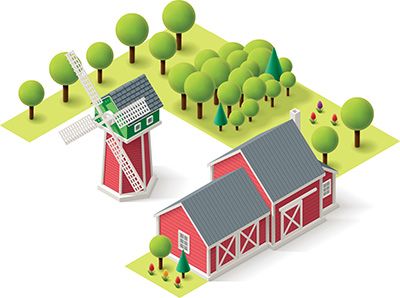The COVID-19 pandemic has forced our society to adapt to radical changes, begin to consider our own immortality and strike major fear among business owners. We are still unclear what exactly the long-term impact will be, but most business owners are taking action now. Farm operators, like any other business owner, need to begin to consider the succession of their operations. They need to plan ahead for their own safety and the transfer of their legacy. Now more than ever, planning for the succession of your farm should be a priority. If you're unsure where to begin, we can help.
Farmers, like any other business owner, may feel both fear and anxiety due to the economic impact from the coronavirus COVID-19 pandemic. Farm operators have a team to support and operations that must continue in order for their livelihood and legacy to live on. With the potential for illness or death feeling very real for most Americans, now is the time for the farm owner to consider farm transfer planning. Farm transfer planning is essential for ensuring the proper transition of ownership and control of the farm; this includes what will happen to the land, operations, livestock, buildings or any other farming equipment.
With the COVID-19 crisis, we are all feeling more vulnerable, so here are how farmers should begin planning.
Take an inventory
It's a great idea to begin by taking an inventory of your business. Start by creating a list of what assets, debts and creditors your business may have. For each asset and debt, assign an estimated value. Once you know what you have it will make it easier to begin thinking about transferring ownership and what this transfer may look like. If you're going to keep the farm in the family or if the future farm owners are working on the farm currently, you may want to consider having a conversation with them. While you want to put your goals in writing, it is also a good idea to have this conversation for your own peace of mind.
Revisit or create a business succession plan
Oftentimes, a buy-sell agreement will be used as part of a business succession plan. Language regarding what happens to the farm in the event of retirement, disability or death should be included in this agreement. The actual transfer of the farm ownership would take place after one of the triggering events has occurred (i.e. your potential disability, retirement or death). The details of the transfer will be clear, including the buyout price, who the successor owners will be and other important terms regarding the transfer of ownership. It may be a good idea to consider purchasing a life insurance to fund your buy-sell agreement. Life insurance is a great way to ensure that your loved ones have access to liquidity following your death. Even if the life insurance isn't used for a buy-sell agreement, it may come in handy to pay a mortgage, cover funeral expenses and more. Speak with an experienced attorney and financial advisor about these options to see which is the best for you.
Incapacity planning
Because of the pandemic, more Americans are considering planning for their potential incapacity, at a bare minimum. Victims of coronavirus may find themselves on a ventilator for weeks, unable to make any decisions for themselves. The farm operator needs to consider creating an incapacity plan now while they are of sound mind. In considering these documents, you will want to think about the right individuals to fill each role. Make a short list with two columns - one column will be for individuals you feel comfortable stepping in to handle farm affairs and other financials and the other column would list individuals who can handle health-related decisions. Your incapacity plan will include a living will, durable power of attorney and health care proxy. Each document serves a different but important purpose.
The living will
The living will is an advance directive that will make clear your end-of-life wishes. If you're in a persistent vegetative state, end-stage condition or terminally ill and do not want life-prolonging measures to be taken, this is the document that will give your health care surrogate the authority to act for you.
Your health care proxy

The health care proxy is also known as a medical power of attorney or a designation of health care surrogate. The listed individual will have the authority to make important medical decisions for you, should you be unable to make these decisions for yourself. When considering the living will, your health care surrogate is the individual that would honor your wish to either have life support removed (or the alternative, should you wish to be kept alive by artificial means).
The durable power of attorney
The individual you have chosen to act as your agent under the durable power of attorney will have the power to continue running the farm operations, paying bills and dealing with any other financial matter that may arise. This individual can act if you're unable to do so yourself, even if you're just physically sick at home but still able to make cognitive decisions.
Revisit or create your estate plan
Having the appropriate transfer documents in place is essential and the traditional transfer documents in most estate plans are part of the farm transfer plan. While your buy-sell may address what happens to business at death, you may need to go the extra step with a trust. If the farm is owned by an entity such as a corporation or a limited liability company, you will want to assign your shares of stock (or membership interest) into the revocable living trust. An experienced attorney will help you accomplish this important step and after they do, you would have successfully kept your farm out of the probate court. Having a trusted individual nominated as your trustee is important as well since they may take over farm operations if you become incapacitated. You may want to consider choosing someone who is already familiar with farm operations and have a conversation with them so that they understand their potential role.
How can I take action today?
Planning for the succession of a farm isn't something that should be rushed but with the current pandemic showing no end in sight, now is the time to take action. Prior to the corona virus, you could simply call an attorney, schedule an appointment and then execute your documents once they were ready for review. Now with social distancing, the process looks a little different. It's important to find an attorney who offers virtual and telephonic consultations. The entire process will likely be handled virtually, which is why it's crucial that you come prepared. If you don't have access to email, then let the attorney know so that accommodations can be made for you. In most states, virtual notarization and even the virtual signing of estate planning documents is permissible. You will want to see what the lawyers are offering as a way to both keep you safe, provide you with valid documents and ensure the timely execution of these documents.



